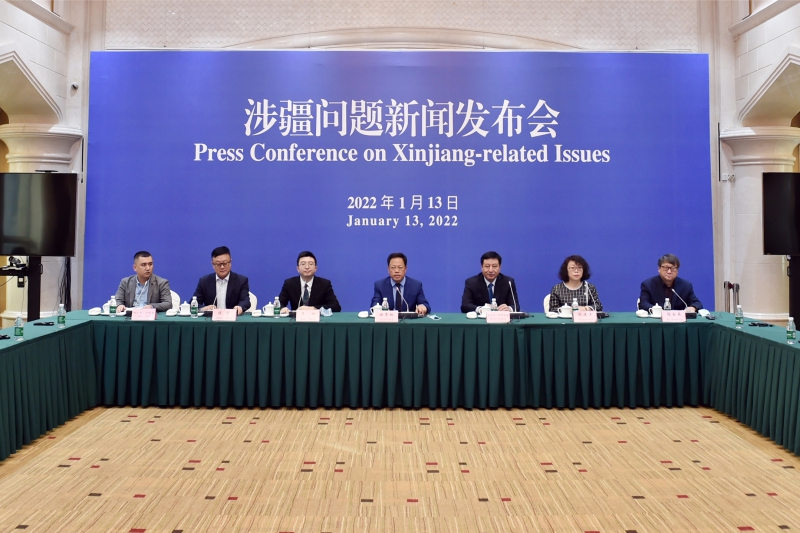
Xu Guixiang: Hello, fellow media reporters, experts and scholars! I’m Xu Guixiang, the spokesman of the People’s Government of Xinjiang Uygur Autonomous Region. Today we invite Mr. Ali el-Hefny, former Deputy Minister of Foreign Affairs of Egypt and professor Hiroshi Ohnishi of Keio University, Japan to attend this press conference. They will join us via video link.Other attendees for this press conference are Elijan Anayat, spokesman of the People’s Government of Xinjiang Uygur Autonomous Region, associate professor Jiao Yang of Department of International Law, China Foreign Affairs University, member of Chinese Society of International Law, professor Wang Yiwei of School of International Studies, Renmin University China, professor Xie Guiping of Zhejiang University, professor Yu Fengchun of Zhejiang Normal University, professor Zhang Jianjiang of Law School of Xinjiang University, professor Chen Tong of School of Political Science and Law of Xinjiang Normal University, professor De Quanying of Law School of Xinjiang University of Finance and Economics and associate professor Alim Satar of Law School of Xinjiang University.
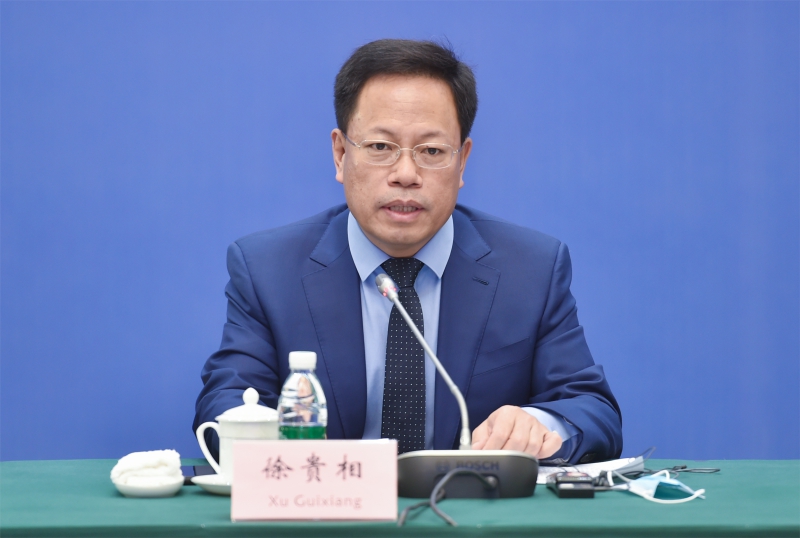
First of all, I’d like to share my views on related issues.
On December 23, 2021, the United States signed into law the so-called Uygur Forced Labor Prevention Act.The act turns a blind eye to facts, slanders the human rights conditions in Xinjiang and flagrantly gets involved in Xinjiang affairs by suppressing enterprises in Xinjiang to mess up its development. It rudely interferes in China’s internal affairs by crafting schemes to contain China’s development through Xinjiang-related issues.It meets strong condemnation by Chinese people and those in the international community who seek to uphold justice.
Based on disinformation, lies and fallacies, the United States fabricated Uygur Forced Labor Prevention Act without any basis in international law or facts. It indulges in the application of its domestic law on sanctioning related entities and individuals in Xinjiang. Such disgusting conduct is a manifestation of the United States’ promotion of power politics and abuse of bullyism. What’s worse, it’s trampling of the spirit of rule of law in the human society, contamination to the international environment of rule of law and irony to the US style sense of values. The United States aims to create “forced unemployment” and “forced poverty” , violate the human rights of all ethnic groups including the Uygurs and undermine the good situation of social stability and harmony, peace and contentment of its people in Xinjiang rather than safeguard the benefits of the Uygurs. It shows that the so-called act is an out-and-out evil act.
The allegation that there’s so-called “forced labor” in Xinjiang is simply a pseudo-statement. Xinjiang upholds a people-centered philosophy, holds high the banner of the socialist rule of law, strictly abides by the Chinese Constitution and laws and regulations and actively implements the international labor standards to fully secure the labor rights of people of all ethnic groups. Governments at all levels adopt a pro-employment strategy, fully respect workers’ will and protect their legal rights so that people of all ethnic groups create a happy life with their hard work and realize development.These concepts and practices have been integrated into the social life in Xinjiang, mirrored themselves in people’s smiles and fully recognized by the international community, which is unquestionable and undeniable.
Now let’s invite experts and scholars to share their views with us.
Xu Guixiang: First of all, let’s contact Mr. Ali el-Hefny, former Deputy Minister of Foreign Affairs of Egypt via video link and give him the floor.
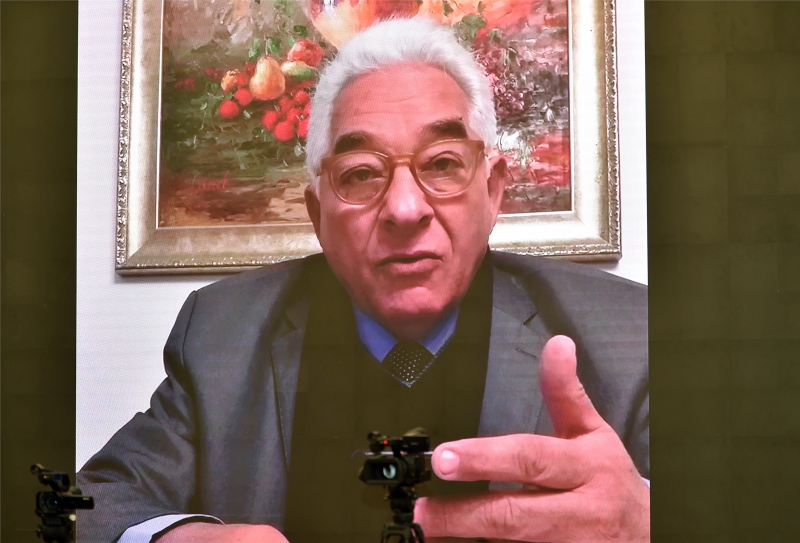
Ali el-Hefny: Please allow me to thank Xinjiang Uygur Autonomous Region for inviting me to attend this very important conference and give me an opportunity to share my views, observations and judgments with you.
My views, observations and judgments are based on my four-year experiences as an ambassador to China and my 20 odd years of research into and experiences of China’s domestic affairs and diplomatic policies. No other country has experienced as many challenges and difficulties as China has. With one fifth of the world’s population, China possesses vast territory and borders with 10 odd countries.We could say it’s a subcontinent. China has also inherited and confronted many various kinds of challenges. We must acknowledge that since the founding of the People’s Republic of China in 1949, several generations of its leaders have made great achievements that most countries in the world have not made, which is a miracle.
The Communist Party of China has suffered from some isolation imposed by other countries for a very long time, which is simply because several foreign countries do not identify with the choice and directions of development of the Communist Party of China. However, China has found its own mode of development and has not asked for the assistance of international financial institutions. Nor has it brought burdens to other countries in the world.In particular, it has not asked the United Nations and its special agencies for assistance.Instead it has depended on its own resources for development, no matter how scarce they have been.
What the Communist Party of China and several generations of its leaders are much concerned about is how to meet the needs of the vast majority of Chinese people to continuously improve their living standards. It is known to all that China has participated in signing Universal Declaration of Human Rights, signed and adopted a number of other international human rights-related agreements.China also strictly observes and implements human rights related guidelines and protocols to safeguard in particular Chinese people’s rights for social economic development.
In the practices of various places across China, as the related guidelines of Universal Declaration of Human Rights is observed based on the local situations and challenges, related practices to protect human rights are conducted, in the sector of security in particular. By means of such methods, various places protect their national sovereignty, territorial integrity and social peace and stability.
The Communist Party of China has been much concerned about the situations of the western border areas of China, Xinjiang in particular because it was infiltrated by some foreign organizations and some violent terrorist acts.Therefore, this problem has affected peace, security and stability of the region. In fact, the Chinese government has taken many actions to protect peace and stability in the region. Actions are oriented to enable the region to enjoy the benefits of development as other parts of China do and ensure that it enjoys equal attention and support as other part of China do.
No one is in the position to lecture China on how to protect peace and stability in the region. All the attempts to lecture are solely suppression on China and such conducts are doomed to fail. There are other countries that intend to tarnish China’s image, undermine its reputation and sabotage its peace, stability and security.These attempts will definitely fail and these plots, plots of sanctions in particular should not continue.
As the sanctions will affect the benefits of Chinese people and bring negative effects on the pace of China’s development as we witness today, the expansion of such sanctions will in turn affect foreign entities and individuals, which lays bare the real intentions of these attempts. That is, they are related to the overall relation between China and these countries that have imposed sanctions, harsh competitions, in particular in science and technology, and the unprecedented achievements China has made in recent years. Maybe some countries are driven by anxiety seeing China make unprecedented achievements in high tech, space science and technology and military, but they try to hide their real aims.
China has proved time and again that it is competent to handle such huge and tough challenges and trials, which is the core of the problem and the very real aim of imposing sanctions that people in Xinjiang and other parts of China should know and be clear about. However, in the near future, under the leadership of the Communist Party of China, Chinese people should keep united and focus exclusively on development and realization of the Chinese dream so that China will become a more livable country that keeps improving its people’s living standards, keep working hard for the development of China to make it a more prosperous and stronger country. Thank you all.
Xu Guixiang: Now let’s contact professor Hiroshi Ohnishi of Keio University, Japan via video link and give him the floor.
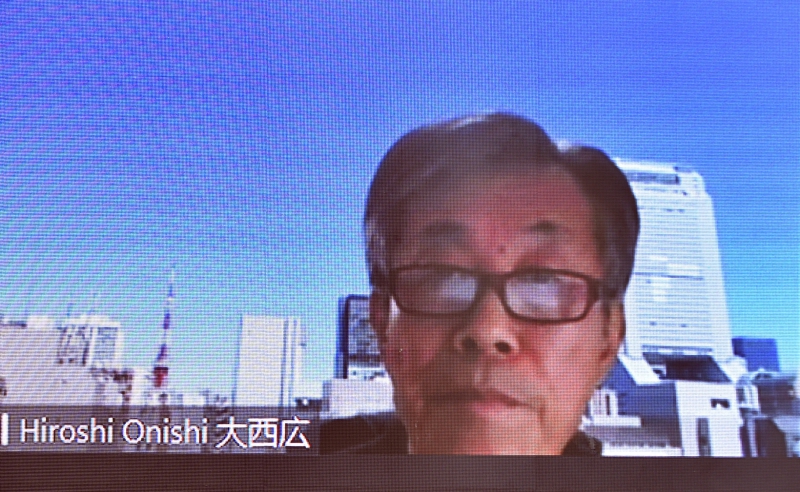
Hiroshi Ohnishi: First of all, please allow me to make an introduction. I’ve been to Xinjiang for surveys for my research on the development of ethnic minorities in China. I’ve done surveys in Xinjiang for 11 times. I have a number of Uygur students. I’d like to recommend the book I’ve written, titled Chinese Minority Problem and Its Economic Disparity. I’d like to express my views concerning the issue of so-called “forced labor” propagated by the Western media. I’d say that 99% of them are wrong and fabricated. The propaganda of the Western media has intensified the ethnic divide and made the situation worse.
According to the propaganda of the Western media, “forced labor”exists in three sectors.
The first sector is the vocational education and training center. The second sector is labor related to cotton picking. The third sector is the collective labor transfer from the rural areas in Xinjiang to the developed coastal areas. However, I do not have detailed information about the first sector.Therefore, I’d like to express my views on the labor of cotton picking.
About 20 years ago, students at Xinjiang University went cotton picking for once during summer vacation and Han students went cotton picking too. Several decades after that, with the improvement of automation of cotton picking, now 85% of cotton picking is done automatically.Therefore, I am not so sure whether the information 20 years ago was accurate. But there’s no “forced labor” now.
As shown in this photo, on the left is the contaminated cotton in China as reported by BBC, which are all old photos. In fact, now cotton picking has been highly mechanized and in most areas mechanized cotton picking has been applied.
Another sector I’d like to introduce to you is the collective labor transfer in Xinjiang. In 2010 I did a survey on the collective labor transfer. In 2010, my students and I went to Kashgar for the survey of “forced labor transfer”. We can see from the photo that labor was not forced to transfer from Xinjiang to the developed coastal areas. Instead the labor transfer to the coastal areas was initiated so that people in backward areas were provided with better living conditions.
The photo on the right is about my going to Kashgar to do field survey on “forced labor transfer” . It was shot by one of my graduates in his hometown.At the moment I was asking the local people “Are you willing to have labor transfer?”Local people all told me that Working in other parts of China through labor transfer enabled them to improve their living standards and they were not forced.There was no forced labor transfer and they were all very happy to have such opportunities.
As what I mentioned just now, not all companies open their factories in Xinjiang, so there is the trend of collective labor transfer in rural areas of Xinjiang to the coastal areas of China and the employment conditions and environments keep improving. For instance, inside the dormitory building are halal dining hall and bathroom. Many Uygur chefs go along and they are paid favorably.Besides, accident insurance and medical insurance are provided for workers, and compensation is provided in case of accidents. Cadres are sent along to monitor labor conditions. Workers work for eight hours a day and have two days off on weekends.The companies cover workers’ travel expenses to the factory and those of their families to visit their relatives. DVDs reflecting the living conditions are produced so that the families are informed of the local situations.
Therefore, my conclusion is that the “forced labor” propagated by the Western media is false and fabricated.The propaganda of the Western media has intensified the ethnic divide and made the situation worse.
That’s end of my speech.
Xu Guixiang: Thank Mr. Hiroshi Ohnishi for your excellent speech.Welcome to Xinjiang for a visit at your convenience. Thank you.
Xu Guixiang: The leader of the United States was determined to sign into law Uygur Forced Labor Prevention Act regardless of the resolute opposition of China and people with vision around the world. Then how did this so-called act come about? What are the hidden schemes? Now let’s contact professor Yu Fengchun of Zhejiang Normal University via video link and give him the floor.
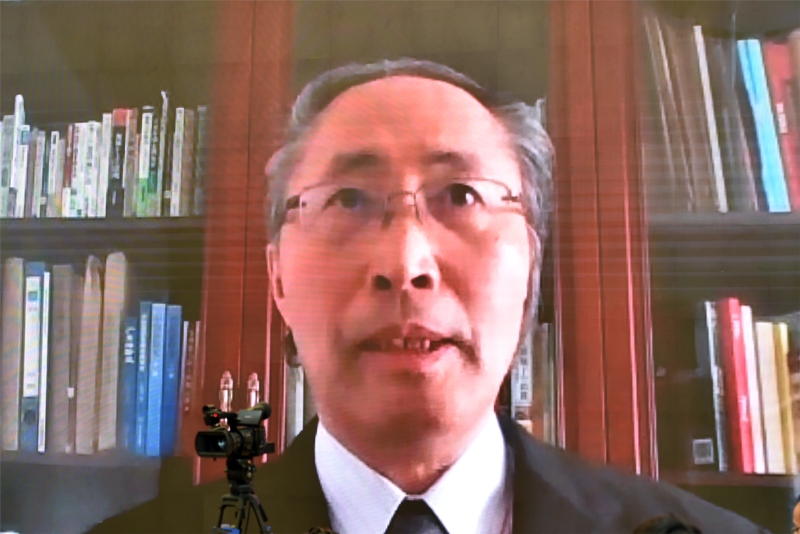
Yu Fengchun: The maneuver the United States adopted to disguise the act is as follows. First, it manipulates the East Turkistan organization to instigate terrorist attacks. Second, it interpreted China’s counter-terrorism measures as so-called “Xinjiang issues” and then framed them into “human rights in Xinjiang” to realize its scheme of containing China through Xinjiang and holding back its development.Be specific, it has three moves.
Its first move is to incite and even support the East Turkistan organization for its own use. In October 2004, after the fall of the Taliban regime, the Bush administration of the United States resumed its established policy toward China, namely preventive containment when it took office. It had two cards mainly, that is to arm Taiwan and support the East Turkistan organization. In terms of the former, the United States kept selling advanced weapons and equipment to Taiwan. In terms of the latter, it supported the East Turkistan organization including the World Uygur Congress,and deleted the ETIM from the list of terrorist organizations in 2004 in particular. Meanwhile, the US leaders of various levels interviewed heads of the East Turkistan organization, nominated its member for Nobel Peace Prize, refused to send its members back to China for trial and openly boosted its influence and aided it.
Its second move is to put on a legal veneer for the disgusting conducts of the anti-China forces.To make Uygur Forced Labor Prevention Act show up in public, the United States and its allies have racked their brains. One is to make what’s illegal legal.For example, it supported the World Uygur Congress to set up the so-called the Uygur Tribunal to seek “hearing”on Xinjiang related issues such as the so-called “genocide” and“forced labor”.The other is to make lies “evidences”.For example, in early 2021, Australian Foreign Minister Payne urged China to allow international observers, including the UN High Commissioner for Human Rights to be given “meaningful” and unfettered access to Xinjiang.Canadian Foreign Minister Freeland claimed that his government was gravely concerned about human rights conditions in Xinjiang, China. After the above-mentioned preparations, the US congress reintroduced the updated version of Uygur Forced Labor Prevention Act.
Its third move is to deliberately extend the scope of the so-called “Uygur”ethnic group.In the so-called Uygur Forced Labor Prevention Act, the ethnic affiliation of the US “long-arm jurisdiction”includes not only the Uygurs, but also the Kazakhs, Kirgiz, Tibetans, even “members of other persecuted groups in the People’s Republic of China.”Its geographical boundary goes beyond Xinjiang and is wantonly defined to be across China. The United States deliberately misrepresents at will and claims that it plans to restrict all the products made in China as products made with “forced labor’.
The United States allegedly claimed that there’s “forced labor” of Uygurs in Xinjiang,which is not supported by any facts and violates the basic investigation procedures of human rights and labor laws existing in the United Nations and international organizations.What’s more, it violates guidelines on the independence and impartiality of members of the human rights treaty bodies under the Addis Ababa Guidelines.It is an out-and-out one way, self-directed framed act.
Xu Guixiang: The Uygur Forced Labor Prevention Act is another Xinjiang-related sanctioning act signed by the United States after the Uygur Human Rights Policy Act of 2020.What are its aims? Can they be realized? Now let’s contact professor Xie Guiping of Zhejiang University via video link for his views.
Xie Guiping:In recent years, the United States has produced a series of Xinjiang-related anti-China reports in an organized, premeditated and planned manner under the disguise of “human rights” to hype up the so-called “forced labor” by all means regardless of the great efforts and achievements made by China’s government for people of all ethnic groups in Xinjiang in economic development, livelihood improvement, human rights security, anti-terrorism and de-radicalization. Moreover, it manipulates anti-China scholars, media, think tanks and anti-China individuals in the vain hope of making the anti-China contents real, confusing the audience and misleading the international public opinion by denigrating and smearing China’s governance of Xinjiang, hurting the national image of China and damaging our national reputation. It plays with presumption of guilt and signs in Xinjiang-related issues into law to “legalize” its interference in China’s internal affairs.
The evil act fully reflects that the United States takes the chance of regarding “human rights” as a moral issue so as to win the attention and support of the international community based on “new Cold War” mentality and geopolitical consideration. Its aims are as follows. First, it intends to unite, draw in and bind more countries, international organizations and multinational corporations to join the US-led camp to isolate, restrict, block, contain, sanction and suppress China’s development and rise. Second, it intends to realize the US strike on China’s related industries in the whole chain from raw materials to products, and expand from the unilateral strike to a multilateral one on China by gathering the so-called “democratic countries” across the world. Third, it intends to create massive unemployment in Xinjiang, make it plunge into poverty and backwardness, undermine its security, stability and ethnic unity, contain it with chaos, contain China through Xinjiang, hold back China’s development and obstruct its rise.
In nature, the Xinjiang-related act exposes that the United States applies unilateralism, protectionism and bullyism in the name of so-called “human rights”, which goes completely against the WTO principles and does grave harm to the international economic and trade order and free trade rules. At present, the international community needs to work together to address such urgent global challenges as COVID-19, slow economic growth and the climate change crisis. However, the United States wields human rights as a weapon to deliberately enhance differences in ideologies and values, forms cliques and divides the world by creating tensions and conflicts between opposing political camps rather than reflect on its own human rights stains in history and reality. Its conduct brings more troubles to the global cooperative management of crises, reverses the deeply integrated globalization, adds to the tension, antagonism and opposition between camps and damages the prospect of international cooperation. What the United States does brings no good to anyone and does harm to world peace, security and development.
Xu Guixiang: Does Uygur Forced Labor Prevention Act have a legal basis? Are there facts to support it? Now let’s invite Alim Satar, associate professor of Law School of Xinjiang University to share his views with us.
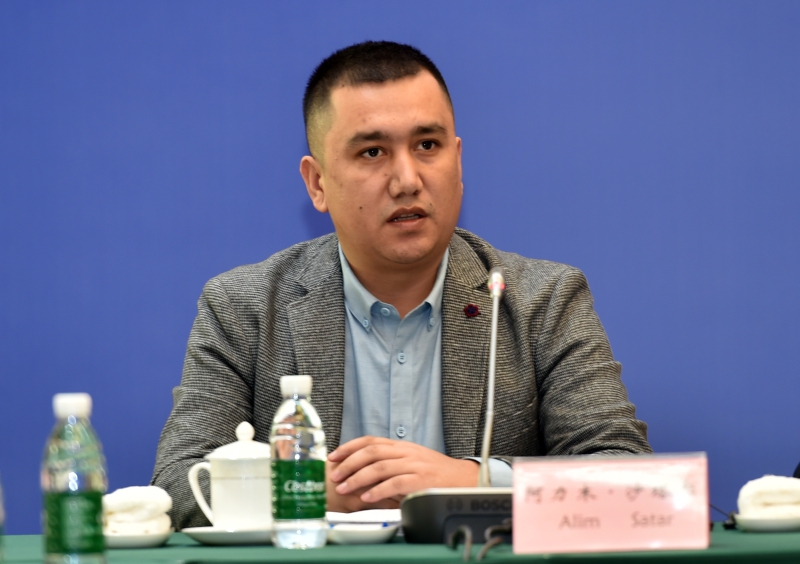
Alim Satar: The so-called “forced labor” in Uygur Forced Labor Prevention Act of the United States is defined according to Section 307 of the Tariff Act of 1930 of the US domestic law, which prohibits the importation of all goods produced by “forced labor”entering at any of the ports of the United States. The so-called “forced labor” refers to all work or service which is exacted from any person under the menace of any penalty and for which the said person has not offered himself voluntarily. In the United States’ view, there is “forced labor” in all the products in Xinjiang and they should be excluded from the US market.
What needs emphasizing is that Section 307 of the Tariff Act of 1930 defines the subject as convict labor,forced labor,indentured labor or more appropriately put, servant.
It must be pointed out that the so-called Uygur Forced Labor Prevention Act regards the Uygurs as “forced labor”, which is sheer fabrication. The Constitution of the People’s Republic of China states clearly that its citizens have the right and obligation to work. People of all ethnic groups in Xinjiang, including the Uygurs are citizens protected by the law. They have nothing to do with the “forced labor” claimed by the Americans.There’s no so-called “forced labor” in Xinjiang either. The US act is a purely pernicious conduct of stealing concepts and quoting them out of context.
Xu Guixiang: Now let’s give the floor to professor Zhang Jianjiang of Law School of Xinjiang University.
Zhang Jianjiang: The so-called Uygur Forced Labor Prevention Act of the United States has two determinations to “forced labor”. One is to lie that there’s “extensive and systematic use of forced labor”in Xinjiang. The other is to make a false accusation that programs such as “pairing assistance” and “poverty alleviation”implemented by our government are forced labor of ethnic minorities.Thus it determines, “Goods mined, produced, or manufactured in Xinjiang Uygur Autonomous Region or by some entities are made with forced labor.”
It is known to all that Xinjiang implements vocational and education training in accordance with the Counter-terrorism Law of the People’s Republic of China, the Measures of Xinjiang Uygur Autonomous Region on Implementing the Counter-terrorism Law and the Regulations of Xinjiang Uygur Autonomous Region on De-radicalization. It educates and rehabilitates people influenced by terrorism and religious extremism with the goal of dealing with the problem at source and protecting people’s basic human rights so that they are free from the encroachment of terrorism and religious extremism.This practice “contributed experience to international actions against terrorism and extremism.”This legitimate initiative created in the spirit of the UN Global Counter-Terrorism Strategy (60/288) and the Plan of Action to Prevent Violent Extremism (70/674), turns out to be evidence of “forced labor”.How absurd is it! In Uygur Forced Labor Prevention Act, (d)(2)(A)of Section 2 requires a comprehensive description and evaluation of pairing assistance, poverty alleviation and any other government labor scheme.According to the United States, there is so-called “forced labor” in all the poverty alleviation programs in our country.
In fact, since reform and opening up, China’s population raised from poverty accounts for more than 70% of the global total over the same period.In 2020, China has secured victory against poverty and has accomplished the tough task of complete eradication of extreme poverty—the first target of the UN 2030 Agenda for Sustainable Development—10 years ahead of schedule.Hence, it makes an important contribution to the cause of global poverty alleviation and the progress and development of the human society.China has helped people in need to get employed through means such as“pairing assistance” and “poverty alleviation” to uphold their competence for development and maximize the protection of human rights internally.Externally it has actively held international cooperation in poverty alleviation and fulfilled its international obligations by means of providing assistance, reducing debts and expanding import etc..The US act as such disregards the enormous contribution China has made for the cause of poverty alleviation in the world, smearing that China’s “pairing assistance” and “poverty alleviation”programs are “forced labor”.The act does not hold water juridically and is unable to be self-contained morally!
Xu Guixiang: Now let’s give the floor to professor Chen Tong of School of Political Science and Law of Xinjiang Normal University.
Chen Tong: The so-called Uygur Forced Labor Prevention Act of the United States is purely a political farce that confounds black and white.Having been working as a teacher of law at university and living in Xinjiang for 40 odd years, I have very deep understanding and real experience of the labor situation here. I am even more clear that the so-called “forced labor” in Xinjiang is utterly groundless. May I ask what the US’ Uygur Forced Labor Prevention Act prevents after all?
The so-called “forced labor” in Xinjiang is simply false. Workers’ job preferences have always served as an important reference for the local government of Xinjiang in designing its employment policies, expanding employment channels, creating jobs, organizing vocational training sessions, and providing placement services. This ensures that people can make their own choices about work and enjoy a happy life.Xinjiang has vigorously implemented employment projects, enhanced vocational training, and expanded employment channels and capacity. Thanks to these efforts, the employment situation in Xinjiang has continued to improve, people’s incomes and quality of life are rising, and their sense of gain, happiness and security has significantly increased.Xinjiang has fulfilled international convention obligations,responded to the concept of decent work and actively applied international labor and human rights standards. This enables the local people to enjoy the right to work to the greatest extent, and has laid a solid foundation for raising the human rights to life and development to a higher level across a broader sphere.
Xinjiang provides employment services and job security in accordance with the law. Strictly following the principles as embodied in the Constitution of the People’s Republic of China and relevant national laws, including the Labor Law, Labor Contract Law, Employment Promotion Law, Social Insurance Law, Law on the Protection of Women’s Rights and Interests, and Law on the Protection of Persons with Disabilities, Xinjiang has formulated and implemented a series of regional regulations based on local conditions, including Measures for Implementing the National Employment Promotion Law, Regulations on Labor and Social Security Supervision, Law on the Protection of Women’s Rights and Interests, and Law on the Protection of Persons with Disabilities, as well as the Regulations of the Xinjiang Uygur Autonomous Region on the Protection of Labor Rights and Interests. These laws and regulations provide a solid legal guarantee for citizens in Xinjiang to enjoy equal rights to work.
The facts speak for themselves. The argument that there is “large-scale forced labor”of ethnic minorities in Xinjiang is in essence a fabrication, trampling of and vicious attack on the labor and employment situation in Xinjiang.The United States does not sign into law Uygur Forced Labor Prevention Act for the sake of preventing “violation of human rights” at all.Rather it is to block China’s rise to power and the great rejuvenation of the Chinese nation!As history will prove, this will not sabotage the happy life of people of all ethnic groups in Xinjiang.Nor will it hold back China’s peaceful development.
Xu Guixiang: Uygur Forced Labor Prevention Act of the United States does not have a legal basis and it violates the international law and the basic guidelines of international relations. Now let’s invite professor De Quanying of Law School of Xinjiang University of Finance and Economics to share his views with us.
De Quanying:In the United States, problems such as sweatshops, illegal child labor, human trafficking, forced labor, forced prostitution and peonage have a long history and are getting worse. However, the US legislature has turned a deaf ear to these “matters of its own” and has instead imposed the label of “forced labor” on China by law, which is completely contrary to the rules and spirit of international law and is a flagrant manifestation of hegemony.
Firstly, the act violates the principle of non-interference in internal affairs. The principle of non-interference forbids sovereign states intervene in each other’s internal affairs. As it is the general principle of international law, the United States evidently violates the principle of non-interference in internal affairs in international law by overriding China’s Xinjiang and the relevant enterprises’ independently chosen trade relations with its domestic law, and forcing the relevant enterprises to abandon commercial dealings with Xinjiang cotton and other products with its domestic prohibition of withholding orders.
Secondly, the act abuses international trade rights rules.The formulation of trade guidelines, including import and export policies, is the right of a country, but it should be done in a way that does not harm the interests of other countries. This act restricts products from Xinjiang, even products produced in China in general to be exported to the United States, which is the United States’ unilateral, protectionist bullying practice in trade and gravely damages the normal order of international trade.
Thirdly, the act is the utmost violation of human rights. It sets the rule of rebuttable presumption, which means no matter whether there’s determination of “forced labor” in essence, it presumes that all the products made in Xinjiang are made with “forced labor”!It requires that the US Department of Homeland Security provides a list of entities cooperated with the Chinese government with “forced labor”, which completely exposes its sinister intention and provides ample evidence for its violation of “the Uygurs’ human rights” in the name of protecting “the Uygurs’ human rights”.
Based on the act, the Commissioner of U.S. Customs and Border Protection issues withhold release orders and the importer is expected to ascertain that the goods of withhold release order do not involve “forced labor” in the entire supply chain.If the Commissioner of U.S. Customs and Border Protection refuses the objection of a domestic supplier, the domestic supplier will be required to return the suspected “forced labor”goods out of the United States.Under the US’ bullying, some companies in China may choose not to employ the Uygurs to protect themselves, do not use products made in Xinjiang, which may put the Uygurs in Xinjiang in plight. This is the real intention of the United States for signing the act into law, that is to create conflicts, mess up Xinjiang and China! Does conduct as such really mean caring about the Uygurs’ human rights ?
Xu Guixiang: To assert its global hegemony, the United States abuses “long-arm jurisdiction”, wantonly damages the international rule of law and wields the big stick of sanctions here and there.Such vile acts are abhorred by people across the world. Now let’s invite Jiao Yang, member of Chinese Society of International Law, associate professor of Department of International Law, China Foreign Affairs University to share his views with us.
Jiao Yang: As early as in the 1980s, the United States made the Japanese semi-conductor industry including Toshiba collapse by means of “long-arm jurisdiction”.In 2008, Germany’s Siemens global bribery case happened and involved executives and bribery objects were not related to the United States.However, as Siemens listed in the United States, it was fined $1.6 billion by the U.S.government based on “long-arm jurisdiction” of the Foreign Corrupt Practices Act.According to the statistics of the New York Times of 2012,of the top 10 companies cited for violations of the U.S. Foreign Corrupt Practices Act, only one company had its headquarters in the United States. The United States was able to plunder a huge settlement.In 2013, with the tool of “long-arm jurisdiction”, the United States hunt French energy giant Alstom. Besides, European Airbus, Japanese car companies, Swedish Ericsson and other companies have also had similar experiences.
In recent years, the United States has wantonly slandered China’s governance of Xinjiang and exercised unilateral arbitrary sanctions on Xinjiang-related entities and individuals based on its domestic law. In May 2020, the U.S. Department of Commerce put 33 entities in China on Entity List of Export Control and allegedly claimed that 9 entities among them were involved in “violation of human rights in Xinjiang”. In September 2020, under the pretext that there’s so-called “forced labor” in Xinjiang, the U.S. Customs and Border Protection issued export bans on 5 of our Xinjiang-related companies. In October 2020, the U.S Department of Commerce put 18 entities on Entity List of Export Control under the pretext of so-called “human rights” issue, including Public Security Department of Xinjiang Uygur Autonomous Region. In March 2021, claiming that there’s so-called “forced labor” in the production of Xinjiang cotton, the United States put related officials and entities in Xinjiang in the scope of sanction. In June 2021, the U.S. Department of Commerce put 4 photovoltaic companies in Xinjiang and the Xinjiang Production and Construction Corps (XPCC) on Entity List of Export Control under the pretext of so-called “involvement in violation of human rights” .In July 2021, the U.S. Department of Commerce put 23 China’s entities on Entity List of Export Control, allegedly claiming that 14 of them were engaged in the so-called “suppression, detainment and surveillance” in Xinjiang.In December 2021, the U.S.Departments of State and Treasury announced to impose sanctions on 4 officials in China for the so-called “violation of human rights” in Xinjiang.
The despicable acts of the United States have been abhorred and criticized by the international community.Former French Prime Minister Lionel Jospin said, “The U.S. laws can only be enforced in the United States. They can’t be brought to France.” In an interview in 2019 with Reference News,French Senator Philippe Bonnecarrere said, France opposes the U.S power politics. Its “long-arm jurisdiction”spans from Asia to Europe, which has imposed severe challenges on our sovereignty. According to Josep Borrell, a senior EU official,the United States has used sanctions or the threat of sanctions against European companies increasingly and such “extraterritorial sanctions” are a violation of international law. Commenting on the US’ excise of “long-arm jurisdiction”over Nord Stream 2 Project cooperated by Russia and Europe, Russian Foreign Ministry spokesperson Maria Zakharova points out that as the United States keeps pointing fingers at other countries, in the future, it may reach to forbid other countries to “breathe”.Frederic Pierucci, former Alstom executive and author of The American Trap, argues, “The United States has long used the law as a perverse means of weakening its competitors, and all countries should unite to resist U.S. unilateralism.”
As facts prove, “long-arm jurisdiction” has become a hegemonic tool for the United States to suppress foreign entities, interfere in the internal affairs of other countries, and even subvert power of other countries.In order to assert its power in the global arena, it frequently overrides its domestic law over the international law, wantonly provokes the sovereignty of other countries, arbitrarily violates the rights and benefits of enterprises and citizens of other countries.It severely undermines the fundamental principle of international rule of law of sovereign equality of states and gravely violates the international order, which risks international condemnation.The United States keeps applying “long-arm jurisdiction” as a seemingly powerful weapon, but in fact it is like drinking hemlock to quench thirst and will only make the desire of hegemony bigger and bigger until it becomes insane and eventually leads to the downfall. It is the destiny of hegemony of the United States.
Xu Guixiang: The United States falsely claims that there’s so-called “forced labor” in Xinjiang. Then how about the labor conditions in the United States?Now let’s invite professor Wang Yiwei of School of International Studies, Renmin University China to share his views with us via video link.
Wang Yiwei: The United States has a centuries-old history of trafficking, abuse and discrimination against black slaves. Spanning from 1619 when the first batch of slaves were received to 1865, the southern plantations in the United States were the major venues where ethnic minorities including the blacks were forced to labor. To ensure that there was sufficient labor, from 1783 to 1808 when international trading of slaves was banned, the U.S. traders still shipped some 170,000 slaves to the United States through various means, which was one third of the total number of slaves imported into North America since 1619. In other words, forced labor is a stain that can never be erased from its history of getting prosperous.Rising to power by means of bloody slave trade, the United States is still a country where modern slavery is in operation and forced labor issue is undeniable.
Take the forced labor in the private prisons of the United States as an example. Some employers regard prisoners at private prisons as cheap labor to meet the labor shortage of the trades they are engaged in so as to reap high profits. A case of judicial corruption occurred in Luzerne County, Pennsylvania. From 2003 to 2008, two judges were allegedly paid millions by administrators of juvenile detention facilities and placed more than 2,000 youthful offenders whose misdemeanors met with heavy sentences in the absence of legal representation and were sent into privately owned prisons. Those in power regarded the youthful offenders as cheap labor and forced them to do odd jobs such as storage, maintenance, ground handling and food services.They worked long hours in terrible environment with a little pay. In 2020 during COVID-19 pandemic, prison administrators sent prisoners to carry the corpses of COVID-19 patients. The forest fire of California burned for months and prisoners were sent to put out the fire. Prisoners who refuse to work are subjected to whipping and torture, solitary confinement, and their reductions in sentence are affected.Although prisoners do the work at the risk of life, they are paid 12 to 63 cents an hour on average and $ 2 an hour at most. As those who run the prisons make a lot of money, prisoners live in misery suffering from physical and psychological torture. Private prisons of the United States have become hell on earth. The above shows the United States is not in position of talking about the issue of forced labor.
Xu Guixiang: There’s no such thing as a free lunch.Happy life comes from hard work! Now in Xinjiang, people of all ethnic groups share the recognized concept “Work creates a wonderful life”.Their work enthusiasm keeps bursting, their work skills are greatly improved and a full flow of fruits of work is seen. Work has become a good fashion in social life across Xinjiang. Now it’s time for questions from the reporters.
China Daily: I am from China Daily. We are much concerned about the situations in Kazakhstan because there are a number of ports between Xinjiang and Kazakhstan. May I ask how the situations are in the borders between Xinjiang and Kazakhstan and whether exchanges of personnel and trade are affected?
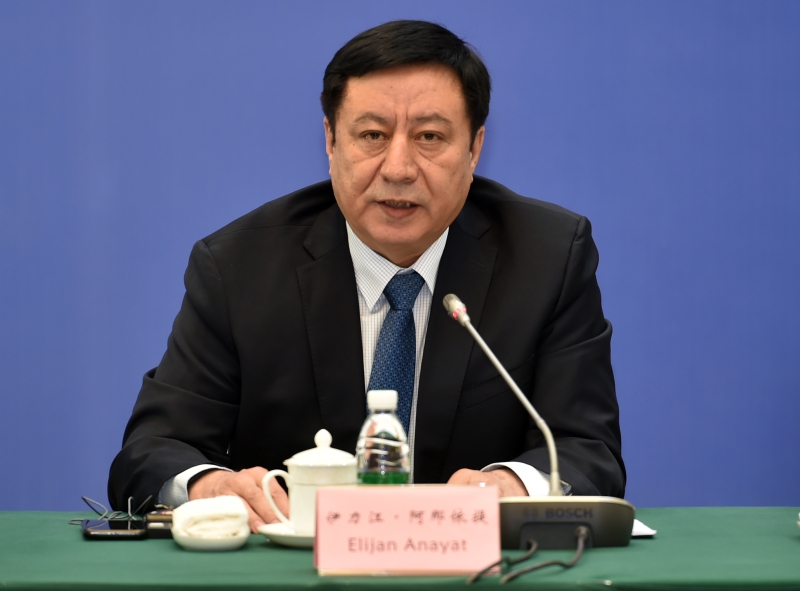
Elijan Anayat: Xinjiang has seen no violent terrorist case for five years in a row. The region now enjoys social stability.People of different ethnic groups and religious beliefs in Xinjiang live together as equals, enjoy unity and harmony, and lead a peaceful and stable life.Culture sees boom and development.The sense of gain, happiness and security of people of all ethnic groups keep increasing. We note that situations in Kazakhstan are in control after the large scale riots. Exchanges between Kazakhstan and Xinjiang are not affected much. As China and Kazakhstan are friendly neighbors and permanent comprehensive strategic partners, we hope Kazakhstan enjoys stability and creates favorable conditions for economic and trade cooperation and exchange of personnel.
Global Times: I’m a reporter of Global Times.Recently Sam’s Club has removed many Xinjiang products out of its stores and many members have canceled their membership.What’s your comment?
Xu Guixiang: I note that recently Sam’s Club under the management of US retail giant Walmart removed Xinjiang products out of its shelves without any appropriate reason. Sam’s Club has been in China for 20 odd years. It’s been making profits from Chinese consumers while removing China’s products out of its shelves, which goes against market rules and does not accord with ethical standards. It will definitely be boycotted by Chinese consumers. We still remember last year H&M Group boycotted Xinjiang cotton and Intel sent a letter to suppliers asking to ban labor and products from Xinjiang, but they finally had to yield to Chinese consumers.
Please don’t underestimate Chinese consumers’ love and passion for their country, their efforts to protect their legitimate rights and the potential ill effects of sneaky political maneuvering. As one is doing business in China, he is expected to abide by China’s laws, respect Chinese consumers’ feelings instead of walking by the side of those US politicians and sinking as low as they do. Brazen slander and denigration are legally responsible.
We also note that recently American electric car manufacturer Tesla opened a showroom in Urumqi and constructed charging stations. Carrefour supermarkets and Metro hypermarkets have all launched shopping festivals to promote Xinjiang products, which are generally well received by Chinese consumers.I also note in the media that according to Tadashi Yanai, chairman, president and CEO of Fast Retailing Co.,Japan, he keeps an objective and neutral position in Xinjiang-related issues.He points out that the US acts are forcing companies to give their “allegiance” to them, but he will not participate in this “game”.
I’d like to remind related foreign companies that there’s no so-called “forced labor” in Xinjiang at all. People of all ethnic groups in Xinjiang are hardworking and Xinjiang products are of excellent quality. I advise these companies consider their own vital interests instead of sacrificing them to suit the will of the United States.
That’s the end of this press conference. Thank all the media reporters for your attendance.Thank each of the experts and scholars for your views.See you !
